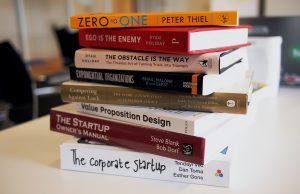Trump says order to soften auto tariffs’ impact will give a ‘little relief’ to industry
U.S. President Donald Trump signed a pair of orders to soften the blow of his auto tariffs on Tuesday with a mix of credits and relief from other levies on materials, and his trade team touted its first deal with a foreign trading partner.
The developments helped ease some investor worries about Trump’s erratic trade policies as he visited Michigan, cradle of the U.S. auto industry, just days before a fresh set of 25 per cent import taxes was set to kick in on automotive components.
The trip, on the eve of his 100th day in office, comes as Americans take an increasingly dim view of Trump’s economic stewardship, with indications his tariffs will weigh on growth and could drive up inflation and unemployment.
In his latest partial reversal of tariff policies, the Republican president agreed to provide carmakers with credits for up to 15 per cent of the value of vehicles assembled domestically. These could be applied against the value of imported parts, allowing time to bring supply chains back home.
Auto industry leaders had lobbied the administration furiously during the weeks since Trump first unveiled his 25 per cent tariffs on imported vehicles and auto parts. The levies, aimed at forcing automakers to reshore manufacturing domestically, had threatened to scramble a North American automotive production network integrated across the U.S., Canada and Mexico.

It offers the industry a “little relief” as companies invest in more U.S. production, Trump said as he left Washington for Michigan.
“We just wanted to help them … if they can’t get parts, we didn’t want to penalize them.”
Speaking at a rally in Warren, Mich., on Tuesday, Trump told a crowd that he believed his policies would help enrich automakers and create jobs, too.
“This is going to create more jobs in this state and this country,” said Trump, who described Michigan as the home of the assembly line, the music of Motown, and of the Detroit Three automakers.
White House press secretary Karoline Leavitt didn’t provide any details on what, precisely, will be in the executive order about auto tariffs that U.S. President Donald Trump is expected to sign later Tuesday.
Autos Drive America, a group representing Toyota Motor, Volkswagen, Hyundai and nine other foreign automakers, said Trump’s order provided some relief “but more must be done in order to turbocharge the U.S. auto industry.”
Candace Laing, president of the Canadian Chamber of Commerce, says the tariff fix fell short of what companies in the deeply integrated North American industry needed.
“Only an end to tariffs provides real relief. Ongoing ups and downs perpetuate uncertainty, and uncertainty drives away business for both Canada and the U.S,” she said in a statement.
The uncertainty unleashed across the auto sector by Trump’s tariffs remained on full display Tuesday when GM pulled its annual forecast even as it reported strong quarterly sales and profit. In an unusual move, the automaker also opted to delay a scheduled conference call with analysts until later in the week, after the details of tariff changes were known.
Meanwhile, U.S. Commerce Secretary Howard Lutnick told CNBC he had reached one deal with a foreign power that should permanently ease the “reciprocal” tariffs Trump plans to impose. Lutnick declined to identify the country, saying the deal was pending local approvals.
Lutnick’s comments helped further lift stock prices that had been battered by Trump’s moves to reshape global trade and force goods makers to shift production to the U.S. The benchmark S&P 500 Index closed 0.6 per cent higher for a sixth day of gains, its longest streak of gains since November.
Rollbacks will have minimal impacts: experts
Sam Fiorani, an auto industry analyst at AutoForecast Solutions, says reducing some of the stacked auto, metal and general tariffs will likely come as a bit of a relief to the industry — even if they’re still paying considerable tariffs.
But overall, he says these rollbacks are small and won’t likely change much, nor will they do anything to stabilize the uncertain economic times with which automakers have been grappling.
“These are moving targets, so there’s always a new question every time anybody sends an email, opens their mouth, whatever it is. So … concrete answers just aren’t there yet and simply signing an executive order doesn’t do much more,” Fiorani said.
And while some of the rollbacks attempt to give automakers some time to bring manufacturing back to the U.S., Fiorani says the measures still don’t take into account just much time and money it really takes to change supply chains.
The measures will also be of little benefit to Canada, Fiorani says, given they are targeted to bring auto manufacturing to the U.S. specifically.
U.S. President Donald Trump plans to levy a new 25 per cent tariff on vehicles imported to the United States. Andrew Chang explains why this latest threat is different, and why it’s concerning trade and industry experts.
Flavio Volpe, president of the Automotive Parts Manufactures’ Association, said partial rollbacks like these are not good enough in such an interconnected industry.
“Partial measures that eat profits up and risk insolvency are not acceptable, the right level is zero tariffs,” Volpe told CBC News in an email.
So far, Canada’s auto industry has received partial carve-outs from Trump’s tariffs for vehicles compliant with the Canada-U.S.-Mexico Agreement on trade, called CUSMA. The current duties only hit the value of the non-American parts of vehicles finished in Canada.
Trump has claimed Canada is taking U.S. automobile jobs, but the two countries have been developing the industry in tandem since the early 1900s. Integration was deepened with the 1965 Auto Pact trade deal between Canada and the U.S.
Automakers respond positively, but volatility remains
General Motors CEO Mary Barra, Ford CEO Jim Farley and Stellantis chair John Elkann praised the planned changes ahead of Trump’s signing of the new order.
“We believe the president’s leadership is helping level the playing field for companies like GM and allowing us to invest even more in the U.S. economy,” Barra said.
Farley said the changes “will help mitigate the impact of tariffs on automakers, suppliers and consumers.”
Elkann said Stellantis looked forward to continued collaboration with the Trump administration “to strengthen a competitive American auto industry and stimulate exports.”
Last week, a coalition of U.S. auto industry groups urged Trump not to impose 25 per cent tariffs on imported auto parts, warning they would cut vehicle sales and raise prices.
Trump had said earlier he planned to impose tariffs of 25 per cent on auto parts no later than May 3.
















Post Comment